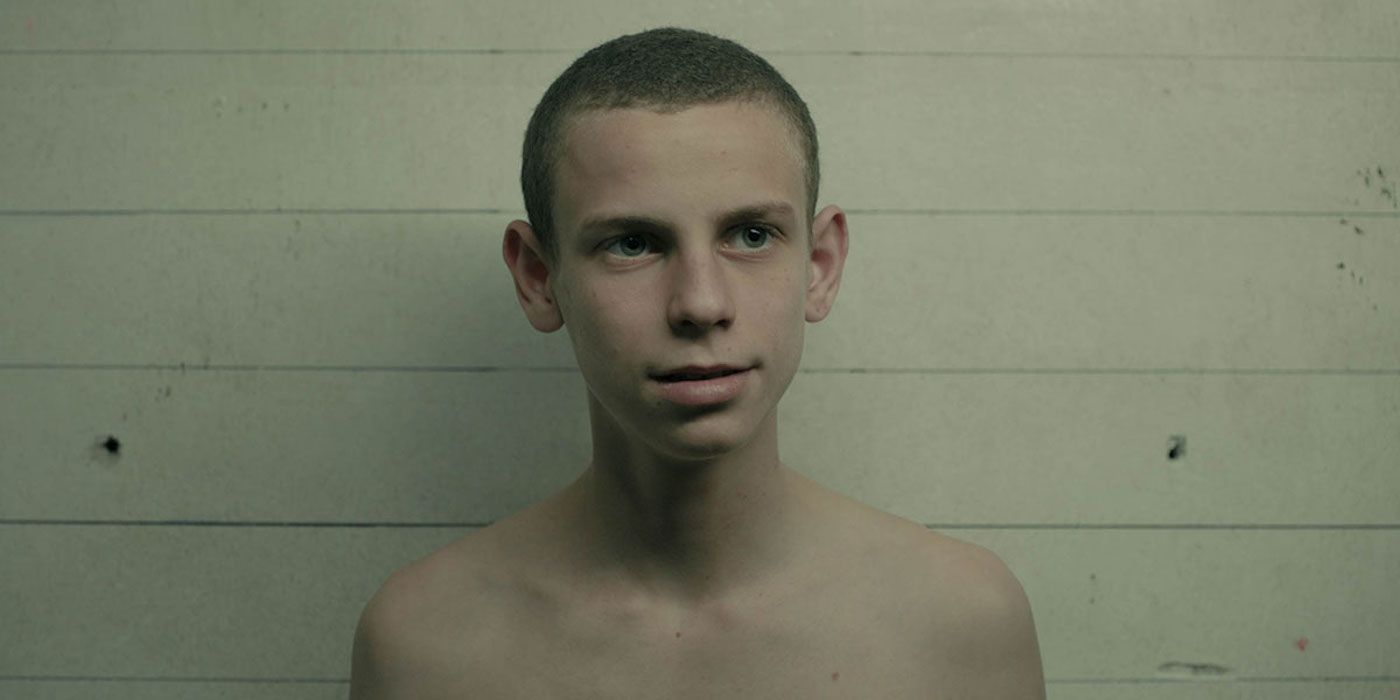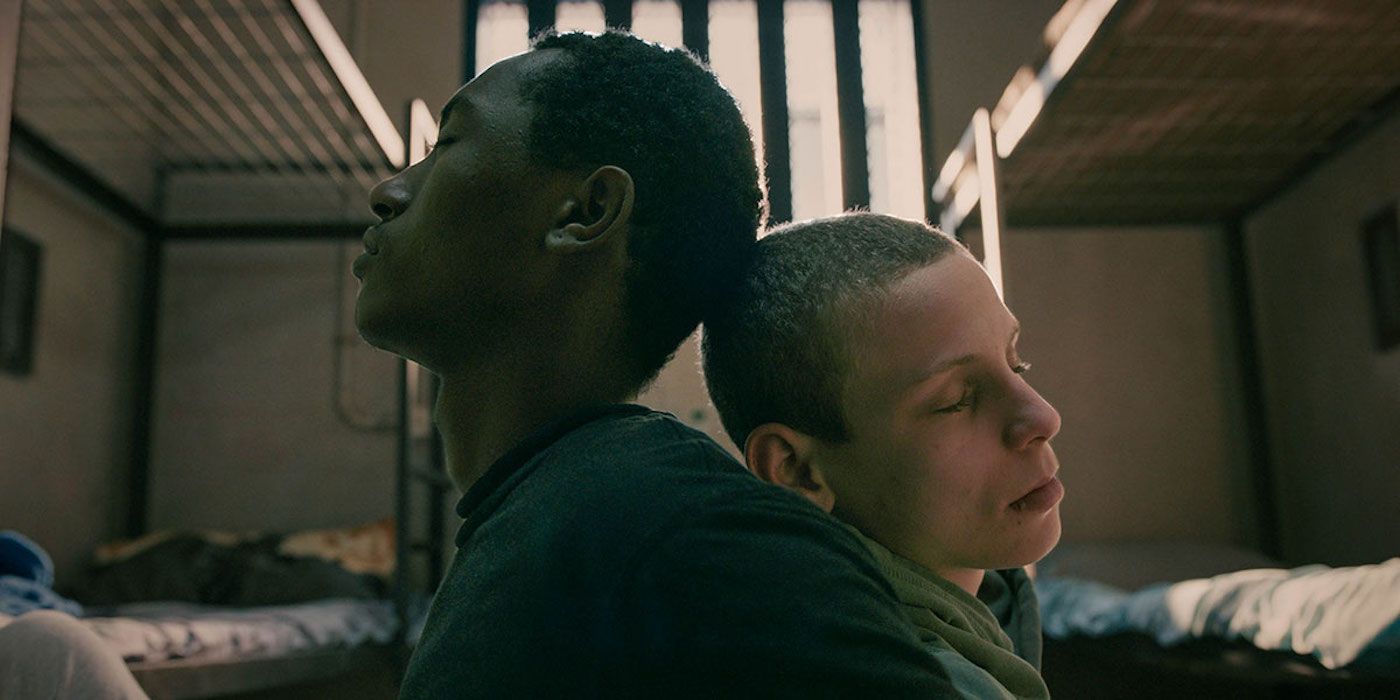There must be something established right out of the gate about the drama series Bad Boy. It hails from the creator of Euphoria Ron Lesham, but it’s important to specify that this is referring to the original series. In other words, don’t hold all the disastrous places where Sam Levinson’s remake ended up against this new story. This is even more important, considering that Bad Boy is quite good. Though there is still much more to experience, as only the first two episodes of the eight-episode series were shared for review, it already brings a refreshing degree of nuance to its story of a young kid who is sent to a juvenile detention facility. At its core, Bad Boy is a story about the stories we tell ourselves about our systems of “justice” and the ones those caught up in them must subsequently tell in order to survive. The result is a grim yet graceful portrait of youth in peril.
This is seen through the eyes of the young Dean (Guy Menaster), whom we meet when he is resting at home. All of a sudden, the police are there, and the teenager is being escorted away. The precise reasons for this are kept somewhat vague, but it seems increasingly likely that this was at least partially set in motion by someone close to him. Such explanations matter little, as he is soon warehoused in a brutal juvenile detention facility where physical and mental harm is understood by everyone to be part of the punishment. The warden Liraz (Heli Ben-Mior) knows full well that there is great pain to be found in the walls of her prison, but she naively clings to the idea that she can somehow lessen it even as it means she becomes complicit in the system itself. Rather quickly, tragedy strikes, and Dean is left as a witness to a death that will put him between his fellow prisoners and the prison guards. The only person he can apparently trust is the mysterious Zoro (Havtamo Farada), with whom he ends up locked away in solitary confinement. They are told by the guards that it is for their own protection, but this feels like a cruel joke considering that it is the broader prison itself in which they are being held that represents an ever-present threat.
Prison Is a Hell We Inflict on Young People in ‘Bad Boy’
It isn’t a spoiler to say that Dean will manage to survive all of this, at least physically, as we are given snapshots of him as an adult where he has become a successful stand-up comedian. Played by co-creator and writer Daniel Chen, there is an intriguing, almost meta quality that this takes on as the character molds some of his traumas into comedy. Importantly, the series never romanticizes or sanitizes the suffering to be found in the prison where Dean is sent. Drawing from his background as an investigative reporter, Lesham makes clear that the system as a whole is not designed to help those who eventually reenter society. Instead, they just continue cycling back through. This is not because of any personal failings. Rather, it is because recidivism is baked into the very foundations of prisons across the modern world. As it turns out, completely upending people’s lives, locking them away in inherently dehumanizing conditions, and then expecting them to just bounce back from this without any support is a pretty surefire way to set them on a path to ending right back in prison again.
The only thing that keeps Dean whole is the stories he himself tells. We see him starting to try this out as a young person where he begins reinterpreting and riffing on traumatic events from his past. As directed by Hagar Ben-Asher, they take on an almost dreamlike quality that provides a respite from the harrowing realities of life inside. It helps us understand why Dean would take the pain from his past and shape it into stories that he has control over. They are also genuinely funny, taking us into silly situations that we can tell are most likely exaggerated. It’s as if Dean is honing his skills at spinning every twist and turn in his life into comedic yarns to ensure we get completely drawn in. He is still a kid when he makes his first halting attempt, but the series does a great job of showing how the initial pieces are falling into place for the stage presence he’ll have as an adult. The fact that it took being sent to prison to discover this talent out of necessity is where the tragedy of his comedy comes into focus. While Bad Boy comes close to embracing a trope about art only coming from suffering, it mostly transcends this by showing that the narrative is about Dean trying to survive and that his storytelling skills are not defined by his incarceration. His imagination and ability to make mirth out of misery come in spite of the suffering he endures, not because of it.
‘Bad Boy’ Explores the Bond Between Two Outcasts
While the relationship between Zoro and Dean is only beginning to be explored in the series, there is already something quietly crushing about it. The simple conversations they have in their small corner of an already small world contain multitudes of emotion as they reflect on the long stretches of time extending before them and what their uncertain futures will be. For all the flair that Dean brings to his stories, their stark reality is a much more painful one that threatens to consume them. The series captures this without pretense, making for an honest portrait of youth who are being made to grow up far quicker than anyone should ever have to. Even as Bad Boy itself has some growing of its own still left to do, it has the potential to be a great story if it continues in the trajectory of these promising initial steps.
Rating: B+
The Big Picture
- Bad Boy brings a refreshing nuance to the story of a young kid sent to a juvenile detention facility, exploring the stories we tell ourselves about “justice.”
- The series highlights the inhumane conditions and cycling nature of the prison system, illustrating how it sets people on a path to recidivism.
- The bond between the main characters, Dean and Zoro, is quietly crushing and reflects the painful reality of youth being forced to grow up too quickly.
Bad Boy had its world premiere at the 2023 Toronto International Film Festival.
Denial of responsibility! TechCodex is an automatic aggregator of the all world’s media. In each content, the hyperlink to the primary source is specified. All trademarks belong to their rightful owners, and all materials to their authors. For any complaint, please reach us at – [email protected]. We will take necessary action within 24 hours.
Khushi Patel is a science fiction author who lives in Austin, Texas. She has published three novels, and her work has been praised for its originality and imagination. Khushi is a graduate of Rice University, and she has worked as a software engineer. She is a member of the Science Fiction Writers of America, and her books have been nominated for several awards.



